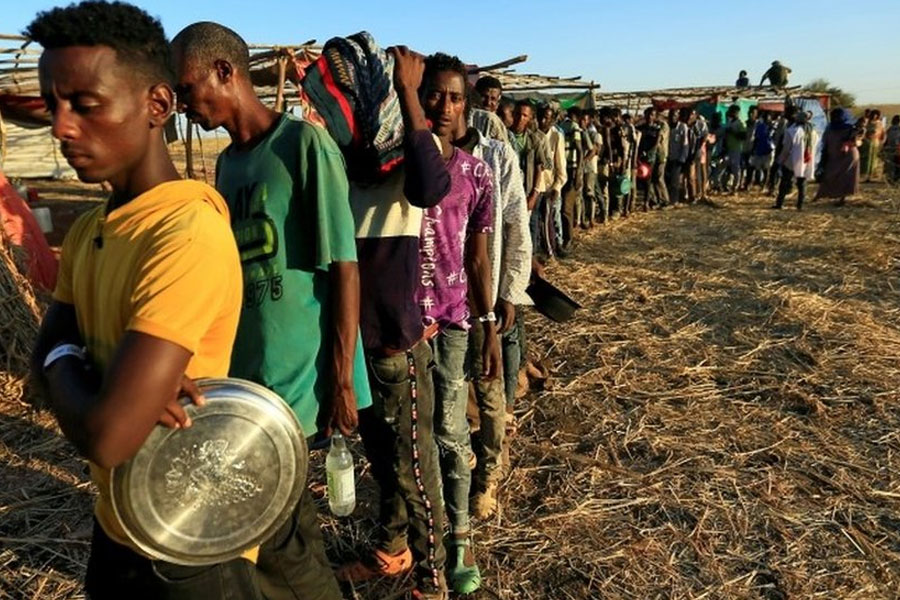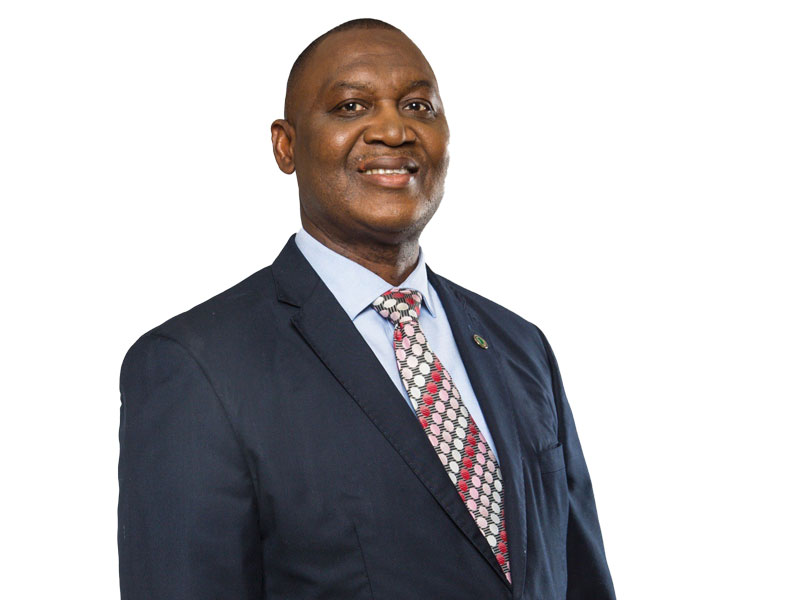
Aug 29 , 2020
By Anteneh Biru (PhD) , Asmamaw Tadege (PhD)
The stance of Egypt and Sudan in the GERD negotiations shows not only a complete disregard for the rights of Ethiopia and other riparian states but also an obstacle to reaching an agreement that satisfies all parties, writes Anteneh Biru (PhD) (antenehbiru@gmail.com), senior engineer at the Norwegian Geotechnical Institute, and Asmamaw Tadege (PhD) (asmamaw.tadege.shiferaw@nmbu.no), associate professor of project management at the Norwegian University of Life Science.
Ethiopia, Egypt and Sudan have been arguing about the Grand Ethiopian Renaissance Dam (GERD) since the commencement of its construction in 2011. Today, the mega hydropower project over the Blue Nile River is three-fourths complete. With the first phase of water filling having already taken place, the Dam now contains 4.9 billion cubic metres of water in its reservoir. Next year, 13.5 billion cubic metres more will be retained.
The negotiations between the three countries have mainly been focused on reaching an agreement over the filling and even the operation of the Dam. Most recently, the three countries proposed their respective version of a draft agreement over the filling and the operation of the Dam. The technical committee is then expected to work on merging those three proposals to come to the point of agreement.
The case of the GERD and that of the broader Nile water sharing are two different issues and must be addressed separately. For now, Ethiopia wants the agreement to focus on issues related to the filling of the GERD without implied or otherwise stated agreement that acknowledges the status quo regarding the sharing of the Nile water. Ethiopia strongly believes that the broader water-sharing agreement needs to be looked at holistically. The water-sharing can only be agreed upon by including other riparian states such that an agreement that binds them all is secured.
In the negotiations thus far, there seems to be a lack of willingness on the part of Egypt and Sudan to accommodate the simple fact that the Nile River is a regional watercourse and that its management must be approached from this perspective.
The stance of Egypt and Sudan in the negotiations seems to be driven by two motives: the applicability of the GERD for drought mitigation, demanding the minimum release of water during dry seasons, while at the same time pushing for the status quo to be binding. These two goals are not only a complete disregard for the rights of Ethiopia and other riparian states but are also an obstacle to reaching an agreement that satisfies all parties.
For any meaningful negotiation to take place, mutual understanding is necessary. From the start, the Ethiopian government has shown understanding of the importance of the Nile River to the Egyptians and the Sudanese. It is also important that Egypt and Sudan recognise the importance of the Blue Nile to Ethiopia and its right to use its own water resources.
Egypt and Sudan have been able to utilise the water flowing directly from the highlands of Ethiopia. Almost all Egyptians have access to electricity and clean water. They are also producing water-intensive cash crops - such as cotton - for export purposes and diverting flows to meet development projects.
On the other hand, Ethiopia, whose highlands contribute about four-fifths of the Nile, faces unjustified obstacles to using the River, particularly from Egypt. This is while around half of Ethiopia's population has no access to electricity and clean water. Ethiopia also faces recurrent droughts that affect farmers that live on subsistence.
Ethiopians need for using the Nile River is not any less than that of the Egyptians or the Sudanese. As a matter of fact, the Blue Nile contains close to 70pc of its surface freshwater and over 70pc of the energy generation capacity of the country.
The current practice of the use of the Nile water - which in effect can be summed up as no country upstream beyond Egypt and Sudan can use the Nile water - is neither reasonable nor fair. It is also causing significant harm to Ethiopia and the other riparian countries by making them alien to their own resources.
Without looking at this injustice and finding a solution, negotiations in the future will not have a good foundation to rest upon. For upholding equitable and reasonable utilisation, a change in the I-will-have-it-all mentality is required on the side of Egypt and Sudan. The GERD is offering a new opportunity for this.
Egyptian authorities are playing for the continuity of the status quo, arguing that they have high water vulnerability and a historic right over the Nile. While the latter claim has neither the legal nor the moral ground, water vulnerability is not exclusive to Egypt either. In fact, with desertification intensifying and the population in the region growing exponentially, the entire basin's access to water is at risk.
Ethiopia, being a landlocked country, has no access to the sea. Neither is its groundwater potential that much more reliable compared, for instance, with that of Egypt, as several studies show. Ethiopian farmers are at the mercy of the rainwater. With deforestation, the water retention capacity of the soil is highly reduced.
Complicating the problem further is the rhetoric and diplomatic gestures that have come from the Egyptian side. In recent months, Egypt’s signalling towards South Sudan, Somalia and Somaliland has been suspect in its motives. All of these three countries have security and stability problems. Not only is Egypt’s activity an end to the negotiations process but also a dangerous move that can exacerbate the already fragile peace and security of the region.
But perhaps the more worrying development has been the role that has been played by the United States, which showed partiality for Egypt although it feigned a neutral role. The US openly pressed Ethiopia to sign an agreement that is against its interests.
Following the first phase filling, there were also reports that showed that the United States is considering withholding aid money to Ethiopia. In addition to that, the US State Department released a press statement saying that Ethiopia may be running out of time to negotiate an agreement on the filling and operation of a mega-dam on the Nile River. These kinds of statements only cause more harm and add to the suspicion that the North American country is not a neutral body.
External parties such as the US and the World Bank must maintain, if all the parties agree, their observer role with impartiality. If the US continues to show favoritism, it will adversely affect the natural process of the ongoing negotiation, and it will have a negative impact.
Knowingly or unknowingly, the international media are also skewed towards the interests of Egypt. The media needs to look at facts on both ends and should hold an impartial stance and let the negotiation process take its natural course.
It is thus worthwhile for the three countries to consider some points that could help them come to a workable agreement. Fragmented solutions will eventually create more problems. The entire Nile basin must be considered as one organ and the countries along it must bear the responsibility of its proper use.
Here, a proper system must be put in place for the management of the resource. Drought and water shortage in the region should be mitigated by a coordinated regional effort, more importantly by sustainable and more effective use of water resources across the region.
The Nile basin farming and system of agricultural production, particularly irrigation water use in Egypt and Sudan, which consume large volumes of the Nile water should be reconsidered. Egypt and Sudan need to put more effective methods for water use in their cities and towns. Where feasible, alternative water sources such as extraction of groundwater and desalination of seawater should be considered. More importantly, to avoid unnecessarily wasting water in the region, where water is a scarce commodity, Egypt must stop diverting the Nile River from its natural watercourse to the Sahara Desert.
Another issue is the colonial agreements being pushed by Egypt and Sudan as proof of their supposedly historic right to use the Nile. It is not only unjustified and a snub to all upstream countries but also an implicit justification of colonialism. These conditions are not acceptable to Ethiopia and the other upstream countries. The better way forward is starting fresh and cultivating the will to forge toward a holistic approach and a win-win solution.
All parties must accept that negotiation is the only way to reach an agreement. Distracting from this and playing around with the geopolitical circumstances of the region can contribute to the disruption of peace and security in an already volatile part of the world.
The agreement, when it is eventually arrived at, must be flexible to accommodate future changes. There may be challenges that the current generation overlooks. It is thus critical to ensure that there is a system in place to re-negotiate and come to an understanding on any new problems that may arise.
PUBLISHED ON
Aug 29,2020 [ VOL
21 , NO
1061]

Addis Fortune | May 03,2024

Radar | Aug 13,2022

Delicate Number | Nov 20,2021

Exclusive Interviews | Dec 11,2021

Fortune News | Dec 19,2021

My Opinion | 131656 Views | Aug 14,2021

My Opinion | 128020 Views | Aug 21,2021

My Opinion | 125983 Views | Sep 10,2021

My Opinion | 123607 Views | Aug 07,2021

Dec 22 , 2024 . By TIZITA SHEWAFERAW
Charged with transforming colossal state-owned enterprises into modern and competitiv...

Aug 18 , 2024 . By AKSAH ITALO
Although predictable Yonas Zerihun's job in the ride-hailing service is not immune to...

Jul 28 , 2024 . By TIZITA SHEWAFERAW
Unhabitual, perhaps too many, Samuel Gebreyohannes, 38, used to occasionally enjoy a couple of beers at breakfast. However, he recently swit...

Jul 13 , 2024 . By AKSAH ITALO
Investors who rely on tractors, trucks, and field vehicles for commuting, transporting commodities, and f...

Jun 28 , 2025
Meseret Damtie, the assertive auditor general, has never been shy about naming names...

Jun 21 , 2025
A well-worn adage says, “Budget is not destiny, but it is direction.” Examining t...

Jun 14 , 2025
Yet again, the Horn of Africa is bracing for trouble. A region already frayed by wars...

Jun 7 , 2025
Few promises shine brighter in Addis Abeba than the pledge of a roof for every family...

Jun 29 , 2025
Addis Abeba's first rains have coincided with a sweeping rise in private school tuition, prompting the city's education...

Jun 29 , 2025 . By BEZAWIT HULUAGER
Central Bank Governor Mamo Mihretu claimed a bold reconfiguration of monetary policy...

Jun 29 , 2025 . By BEZAWIT HULUAGER
The federal government is betting on a sweeping overhaul of the driver licensing regi...

Jun 29 , 2025 . By NAHOM AYELE
Gadaa Bank has listed 1.2 million shares on the Ethiopian Securities Exchange (ESX),...